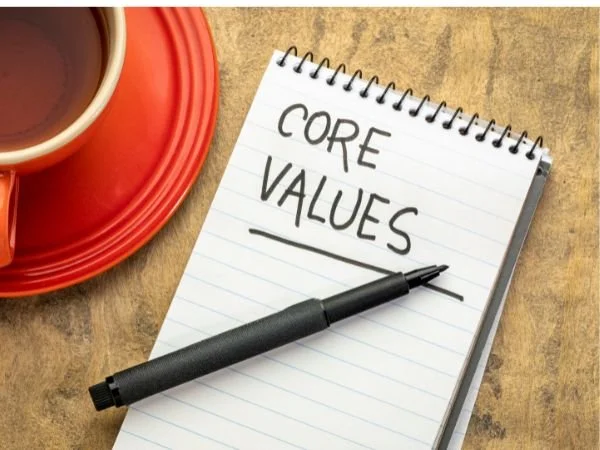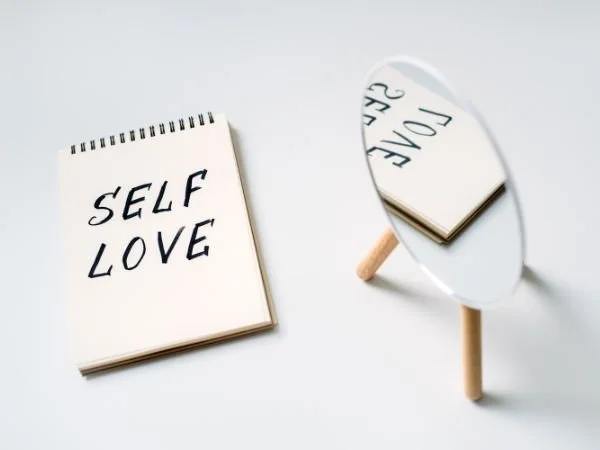110: Should I Stay or Should I Leave?
In this episode, I answer a question from a listener who is debating leaving her husband who has narcissistic traits and has been manipulative and controlling in the past. When she told him that she was leaving the relationship, he begged for a second chance and did start to change his behavior. Now, the listener is having trouble deciding if she should stay or leave the relationship. In this episode, we learn about trusting our intuition and listening to our bodies when we are making challenging and important life decisions. We also discuss why it’s important to take the pressure off these large decisions, the importance of empathy in relationships, and practicing self-forgiveness.
This post contains affiliate links to some of my favorite tools and resources. As an Amazon Associate, I earn from qualifying purchases. Full terms & conditions here.
Book Recommendations 📚
The Covert Passive Aggressive Narcissist: Recognizing the Traits and Finding Healing After Hidden Emotional and Psychological Abuse by Debbie Mirza
The Wizard of Oz and Other Narcissists: Coping with the One-Way Relationship in Work, Love, and Family by Eleanor D. Payson
In Sheep's Clothing: Understanding and Dealing with Manipulative People by Dr. George K. Simon
Recommended Episodes 🎙️
Helpful Resources ✨
Timestamps ⏱️
Introduction: 0:15
Listener Question: 1:43
Outro: 24:20
Have you followed and left a review for New View Advice?
Let me know what you think of the podcast! Podcast followers and ratings help bring new listeners to the show, as well as help me to continue creating content. So if you enjoyed the show, I’d love to ask you to follow and leave a rating on your podcasting platform by:
Head to New View Advice on Apple or Spotify
Click Follow on your podcasting platform
Scroll down (or when promoted) click the 5 star rating!
-
This podcast was transcribed by an AI tool called Castmagic. Please forgive any typos or errors.
Amanda Durocher [00:00:01]:
Welcome to New View Advice. I'm your host, Amanda Durocher, and I invite you to join me here each week as I offer advice on how to move through whatever problem or trauma is holding you back from living life to the fullest. Let's get started. Hi, beautiful soul. Welcome to New View Advice. If you're new here, this is a healing centered advice podcast where I offer guidance for the healing journey. I don't believe I have all the answers you seek. I believe you have all the answers.
Amanda Durocher [00:00:24]:
you just may need a new view and a little help along the way. Thank Thank you so much for joining me for today's episode. In this episode, I am answering a question from a listener who is debating leaving her husband. Her husband has narcissistic traits and has been manipulative and controlling in the past. When she told him that she was leaving the relationship, he begged for a second chance and did start to change his behavior. Now the listener is having trouble deciding if she should stay or leave this relationship. I love this question. I think many people can relate to this question, and I think it really goes back to how do we really know what's best for us and how do we know when to stay or when to leave a relationship.
Amanda Durocher [00:00:59]:
So in this episode, we will be talking about trusting our intuition and how to listen to our bodies when we are making challenging and important life decisions. We also discuss why it's important to take the pressure off these large decisions, the importance of empathy in relationships, and practicing self forgiveness. So before I jump into today's episode, I just always like to mention that if you haven't already, please go check out my website. It has more free resources, including journal prompts, meditations, poems. I just recently started a series called Reflections where I share stories from my own healing journey, and that's all on my website at newviewadvice.com. And today's episode show notes will be at newviewadvice.com/110. So with that, let's jump on in.
Amanda Durocher [00:01:47]:
Dear Amanda, I'm 33 years old and married with 2 children.
To start, I have been married for 9 years together for 15. I have discovered that I am married to a very manipulative, controlling man with narcissistic traits. There have been many times that I have attempted to end our relationship. I just can't handle being so controlled and made to feel like a terrible person anytime I go against his thoughts or ideas. This control even goes into the bedroom and has made me feel disgusted with myself. I eventually lost almost all of my friends. They distanced themselves from me after time and time again of me turning them down for hanging out due to my husband's control. Back in January, I was out of state, alone on a trip, having a wonderful time all to myself.
Amanda Durocher [00:02:23]:
I loved this much needed time. I was really self reflecting and realized how absolutely miserable I was in my marriage. I ended up meeting this guy in a bar. I talked to him for hours. No funny business. I went back home a day later and felt so different. In my mind, I was done with my husband's controlling behavior. However, I didn't know how to go about trying to separate from him.
Amanda Durocher [00:02:43]:
Anytime I would bring up divorce, he would get so scarily angry, threatening with suicide. You name it. The funny thing is that to me, my husband was also miserable, so I never understood why he was against us separating. But I kept quiet and went through the motions of being a wife. A couple months later, I found a way to go on another trip back to see this guy. During this trip, my husband discovered I was lying about the real reason I went. This was my that's it moment. I was done with him.
Amanda Durocher [00:03:07]:
I stood outside a restaurant, called my dad, and told him I couldn't do this shit with my husband anymore. He supported me. My plan was to come home, find a place to live, and move out ASAP. Of course, when I got home, my husband started acting like an entirely new person. He pleaded with me to give him another chance, wrote me what seems like a heartfelt apology letter, started acting kinder, apologized many times for his behavior, cried for forgiveness, and even quit drinking, which was huge for him. I commend his accomplishments, but in my mind, I cannot let go of how he had been. I worry the changes he's made are just temporary. It's been 5 months.
Amanda Durocher [00:03:39]:
Even so, I'm not sure I can truly forgive him for being so cruel to me for so long. How do I figure this out? How do I know if I will ever be content with him? I see the changes he's made, but his controlling nature still shows through, which disgusts me. In a way, I hate myself for not sticking with the promise I made to myself, to get away and never look back. My dad, who I look to for advice, thinks I need to give him another fair chance. Will the disgust I feel towards my husband ever really go away? Is the damage done? I was so certain of my decision when I was done, and now I feel like if I stay, I'm betraying myself. Thank you for reading. Your shows are much appreciated. Thank you so much for this question.
Amanda Durocher [00:04:15]:
I first wanna say I'm so sorry that you found yourself in this situation in such a challenging relationship. I can totally understand why you're feeling confused and conflicted. It sounds like you've been through a lot through this relationship, and it's very hard and confusing to be manipulated and controlled by someone we love. So I'm very, very sorry for what you experienced because I know how confusing it can be because we don't understand we're being manipulated and controlled for much of for most of the relationship. Right? So you've become very self aware throughout this relationship, so I wanna honor that. You're clearly very self reflective. And you've obviously been working on yourself and this relationship. I think this is a great question.
Amanda Durocher [00:04:55]:
You are not the first person I've spoken to with this type of situation. So I know people can relate to this question and that you're not alone in navigating this type of relationship. And I believe, unfortunately, this is all too common. So thank you again for asking this question. So the first thing I wanna talk about is that I think with this question and with your situation, it's all about trusting yourself to make the right decision. You've clearly thought a lot about this situation, your relationship, your marriage, your family. And to me, it sounds like you've been very in your head about it. And when we get in our head and we're dealing with the mind, it's important to be self reflective, to bring self awareness.
Amanda Durocher [00:05:33]:
It's important for you to connect to how you're feeling, to see your relationship more clearly. Right? Like, you see how disgusted you feel in certain situations. And my guess is you didn't always feel that way. Right? You didn't always see that your husband's controlling behavior was leading to the end of friendships or how you feel in the bedroom with him, things like that. So I think the self awareness piece is very important. But to me, it sounds like you've been very self reflective, but you're still having trouble trusting yourself. And this is where I wanna talk about, I think it's important for you to trust your intuition. So I've talked about a few times on this podcast, but I think intuition gets this woo woo vibe.
Amanda Durocher [00:06:06]:
And it can be woo woo. Right? Sometimes the signs we get or sometimes that inner calling feels very spiritual. But I also think our intuition is really just our own inner voice. It's learning to listen to ourselves even when the outside world is telling us something different. Even if what our inner world is telling us, what our heart is telling us is illogical. It's learning to listen and to trust it. And that's really learning to listen and trust ourselves. I mention this because time and time again, through my own journey and through working with people 1 on 1 and in group settings, I'm struck by a female's intuition.
Amanda Durocher [00:06:40]:
How many times a woman says, I just knew something was wrong, and they can't describe how they knew it. Or I've worked with a lot of people who have experienced infidelity and were cheated on, and a lot of them say, I just wish I had trusted that knowing sooner. Right? So many women have told me that when they're practicing forgiving themselves, it's forgiving that they didn't listen to the voice inside them, that something was up in the relationship, that their partner was cheating. I'm struck time and time again by how often people tell me about this inner feeling they have. Right? This inner knowing. And for me, it comes from my solar plexus that's right above your belly button. That's where my knowing resides. And what I find with intuition is that oftentimes our intuition is telling us something and then we don't trust it because second, the mind will come in.
Amanda Durocher [00:07:26]:
And the mind will start to make excuses, will start to invalidate, will start to question that intuition. But the intuition will continue to push us towards what is in our best interest. And so I mentioned this here because the truth is at the end of the day, this is your decision. This isn't anybody else's decision. And I can't give you the answer if you should stay or if you should leave your relationship, and neither can anyone else. So this is a time where I think you're learning to trust yourself and what your body and your heart are telling you. With all that said, I think it's important for you to also take the pressure off yourself. My guess is you're in this headspace of stay or leave, stay or leave.
Amanda Durocher [00:08:07]:
I find this happens many times with people I speak to who are in similar situations is that the decision to stay or leave can feel paralyzing. You feel like you have to make a decision right now and that that's the next step. And I would say that doesn't necessarily have to be the next step. When we have big life changing decisions, one, we don't need to rush the decision. You've been with your husband for a very long time. My guess is part of the reason you're struggling to make this decision is because of the terror of making this decision, the fears that are arising. So I think that if you take the pressure off yourself that you have to make the decision right now, then you can begin to look at what are the fears around making this decision. Because my guess is your inaction and your inability to make a choice might be connected to fears and terrors or overwhelm.
Amanda Durocher [00:08:56]:
And I want you, because you're obviously very self reflected, to really start connecting to what are you so afraid of. Are you more afraid of staying, or are you more afraid of leaving? Are you terrified of making the wrong choice? Are you afraid of being on your own? Are you afraid of staying where you are? Are you afraid if you stay and you trust him that he will hurt you again? What are you most afraid of? My guess is that you do know what's best for you, but you have fear around this decision, and it's becoming paralyzing for you. You know, maybe you're afraid to disappoint your dad, or maybe it's that you're afraid to disappoint yourself if you decide to stay. I'm not sure here, but it sounds like you have a lot of awareness already, so I invite you to continue exploring the feelings around this decision. You know, I think it's important here to be honest with yourself. And the truth is that you could stay or you could leave, and my guess is that you're putting a lot of pressure on yourself to make a decision. But the problem with that pressure is that it can be debilitating or overwhelming and lead to inaction like we've talked about. You know, my guess is there's a part of you terrified right now.
Amanda Durocher [00:10:00]:
Many times, pressure leads to terror and is connected to our inner child. I know for me, pressure triggers my fear of making the wrong decision. I internalized as a child that I was wrong about everything, and I began to believe that everything I did or said was wrong. And I believed the belief I am wrong. So as I've grown up, I can really fear making the wrong decisions, and it triggers for me that inner wounded child. And that's a reason it's important to take that pressure off is because my guess is there's a small part of you, an inner child within you who's very afraid right now, who's afraid of going out on her own or who's afraid of staying and being hurt again. You know, you have to start connecting to these other parts of you and becoming aware of where these feelings are coming from. Right? Another feeling you mentioned is disgust.
Amanda Durocher [00:10:47]:
Where is that disgust living within your body, and what is the message of that disgust, and have you maybe felt it before? You know, for me as a sexual violence survivor, disgust has come up for me in the bedroom in a different way. But as I was healing, especially from being sexually abused as a child, I would feel disgusted all the time around my body. You know, at first, it felt like I was just disgusted with my body and who I was, but the more I dug deeper into that disgust, the more I saw that it was, you know, a 5 year old self that was disgusted with the experience she had around sexual violence. So for you, my guess is your relationship and this situation is triggering an inner child wounding as well. It's just very common. I think most things in our life trigger our wounded inner child. So I invite you to do that inner child work as well, and you can do that through journaling, through meditating. I have an inner child meditation on my website.
Amanda Durocher [00:11:38]:
I can link in the show notes. I also think that journaling is a great way to connect to your inner child, and I have a writing exercise on my website. I'll also link in the show notes. But you can also connect with your inner child by just kind of talking to yourself kindly. Right? When we're reparenting ourselves, it's really talking to ourselves and saying the things that we need to hear. You know, I think of reparenting ourselves as being the parent we needed. So it's being kind to ourselves, but also teaching ourselves how to take responsibility for ourselves, how to do the things that are best for us even if they're not the easiest things. It's being kind to ourselves when we make mistakes, but also holding ourselves accountable.
Amanda Durocher [00:12:13]:
So through this process, I think you're learning to trust yourself and trust your intuition, and you're learning to be kind to yourself as you navigate this situation and to also reparent yourself. Because it sounds like you rely on your dad for advice, but he may be giving you different advice here, or you just may want to make this decision for yourself. Right? You're 33, and your dad's saying one thing, and maybe he is saying what's best for you. But I think what you're getting at through the situation is that you wanna make sure you're making the decision that's best for you. And that's a part of reparenting yourself is just beginning to own your own decisions rather than leaning on your parents to make the decisions for you. And that's a part of growing up. We all have to do it. And so one thing I wanted to talk about, because you did mention that your husband had narcissistic traits, is that I think it's important to note here empathy.
Amanda Durocher [00:13:00]:
And so I've been thinking a lot about narcissistic abuse. I've read a bunch of books about narcissism this summer. And I think it's important when healing from these relationships and when deciding if we wanna stay in a relationship with people who are narcissists or if we are navigating how to keep these people in our lives. Because if you have children with somebody who's a narcissist, you can't cut them out of your life. So many times when we notice somebody's narcissistic traits, we notice somebody's controlling behavior, manipulative behavior. It's at first a little mind bending because we were under that control for so long. So first you have to allow yourself to extract yourself from that and to see the situation clearly and to see you were being controlled. And then after you bring a lot of self awareness, you practice self forgiveness, you see the relationship clearly, and you begin to take your power back, then you have to decide what this relationship is gonna look like moving forward.
Amanda Durocher [00:13:51]:
It's not going to be the same. And I mentioned empathy here because I think when deciding what this relationship will look like with your husband moving forward, you want to gauge and become aware of his capacity for empathy. So people with narcissism are not empathetic. I believe that narcissistic traits live on a spectrum, so some people are not always full blown narcissists, but have many of the traits that go along with narcissism, and one of those is a lack of empathy. And I think it's important for you when making this decision to be honest with yourself if your husband is capable of understanding your point of view, because that's what empathy is. It's being able to take on somebody else's perspective. It's just understanding where somebody else is coming from, understanding their feelings, understanding how many times it comes down to understanding how something you did may have hurt somebody, seeing somebody else's point of view other than your own. And a lot of people with narcissism and narcissistic traits are unable to do that, which is kind of mind bending for empathetic people.
Amanda Durocher [00:14:45]:
At least, I find it mind bending. It's really hard for me to put my mind in the head of somebody who cannot understand somebody else's point of view. But that's true. That's something I've had to be honest with myself about is that there are many people who are not capable of doing that. And when I'm honest with myself in a relationship about somebody's empathetic capability, I'm able to approach that relationship differently. Because if somebody's not capable of empathy, they're not capable of understanding your point of view and understanding your feelings. Right? They're coming from a self centered place. And I ask this because your husband's apologized a lot.
Amanda Durocher [00:15:21]:
So is he understanding what he did wrong? Is he showing you empathy? Is he understanding how his actions in the past very much impacted you? You mentioned he gave up drinking. Maybe that alcohol was keeping him from empathy, but maybe he's showing you empathy now. Or is he apologizing but still not quite understanding what he's apologizing for or not quite understanding your point of view and how you felt throughout this relationship? Because I think empathy is really important in relationships. I think empathy builds intimacy between 2 people. It's how we can really feel seen in relationships. And you sound like a very self reflective person. And self reflective people are often very empathetic and are actually often targeted by narcissists because of that self reflective nature. But I think this is important for you.
Amanda Durocher [00:16:07]:
Because the truth is if you do decide to stay, what are you looking for the relationship to look like? Do you want him to understand how you feel? Do you wanna feel more connected emotionally? Do you wanna feel more connected physically? Do you want him to see your point of view? You have to ask yourself what you're looking for so that you can intentionally communicate that to your husband moving forward. Because if you decide to stay or leave, you're rebuilding your relationship from scratch. That's the truth of the situation is that the foundation wasn't solid, so it broke. Right? Imagine your relationship with a house and it was very rocky and it broke to the ground. And now that this house is broken and in a bunch of pieces, you're choosing to either walk away and rebuild a house on your own, or you're choosing to rebuild this house with your husband with a new solid foundation, which would require you both to be really intentional about what you'd like your relationship to look like moving forward. And so I wanted to mention empathy here because people who exude emotionally abusive behavior are not always capable of empathy. And if that's something you are looking for, it's something that's important for you to see if your husband is capable of. If he is not capable of empathy and that's something you need, it's just about being honest with yourself.
Amanda Durocher [00:17:18]:
You know, I have found as an empathetic person, as I mentioned, it's really hard for me to understand how somebody isn't empathetic. But I've had to accept that that's life. You know? Not everybody is emotionally mature. Not everybody is looking to grow. Not everybody's looking to heal. Not everybody's looking to be self reflective. Some people to me look miserable, but they just wanna stay there. And it's not my job to move them along or to show them why I think they look miserable.
Amanda Durocher [00:17:45]:
That's a judgment honestly on my part when I'm like, but this person's miserable. Why don't they wanna change? Maybe they're comfortable there. Maybe that's their version of happiness. That's their life. And it's not my responsibility to change anybody. And it's really not your responsibility to change anybody either. The question is, is your husband looking to change and grow with you or are you 2 growing apart? And again, I think you intuitively will be able to get the answers to these questions that you are searching for. And it's about listening to the answers you're getting and trusting yourself throughout this situation.
Amanda Durocher [00:18:21]:
So if you're interested in learning about narcissism a bit more or emotional abuse, I did have 3 book recommendations because these books really talk about how narcissists target empaths so often, and they talk about the narcissistic relationship dynamic. And I have 3 books that I did wanna recommend here in case anybody's looking to learn a bit more. I found reading about narcissism to be very helpful along my journey. It's a very complicated subject because it's I feel like a lot of the books make it seem very black and white, and I found through my own experience, it's not so black and white. But these are the 3 books I wanted to recommend. So this might not be for you, but this could be for somebody out there. And it's called The Covert Passive Aggressive Narcissist, Recognizing the Traits and Finding Healing After Hidden Emotional and Psychological Abuse by Debbie Mirza. And, again, I'll list these on my website at neviaadvice.com/110.
Amanda Durocher [00:19:11]:
But this book really talks about covert narcissism, which I think is really interesting. That's the type of narcissism I've dealt with in my own life. And so it was really interesting to read about and to see that I wasn't crazy. That's how I felt reading these books is that, oh my god. I wasn't crazy. I'm not making all this up. The next book I wanted to recommend is The Wizard of Oz and Other Narcissists by Eleanor Payson. And this book talks about all different kinds of narcissism, and I found this book really helpful as well.
Amanda Durocher [00:19:38]:
And I could see different relationships I've experienced throughout my life in this book, and she offers advice for how to navigate these relationships. The 3rd book isn't actually about narcissism. It's called In Sheep's Clothing, Understanding and Dealing with Manipulative People. And this book's by George k Simon. And this book, he talks a lot about the different kind of emotional abuse people experience and different manipulative behaviors. So if you're interested in learning more, I invite you to read these different descriptions on Amazon and see if any of them resonate for you. There's also a 1000000 books on narcissism, and so definitely continue to look for a book that resonates with you and your situation. I found when reading about narcissism myself, not every book really applied to me in my situation, so then it would cause me to question myself.
Amanda Durocher [00:20:20]:
So I really had to find the books that resonated with me in my personal situation. So last thing I wanna mention before we wrap up here is that it's really important for you to practice self forgiveness. It sounds like you're being really, really hard on yourself. You mentioned hating yourself and feeling like you're betraying yourself. Those are very harsh and hard emotions to have towards yourself. You know, we just talked about empathy. Be empathetic towards yourself. Show yourself the empathy that I think you show others.
Amanda Durocher [00:20:44]:
Offer yourself the same grace it sounds like you're trying to offer your husband. Be kind to yourself. The more you understand why you are staying, the more you'll be able to be empathetic and kind to yourself. But I think it's so important that you begin practicing that kind and loving self talk when you feel those hard feelings arise. You are in a very challenging situation. It's not every day you decide if you're gonna stay or leave your marriage of almost a decade. So maybe you're terrified of staying over. I've been thinking about how much courage and bravery it takes to start over, and people do it every single day.
Amanda Durocher [00:21:16]:
And I think that's so incredible. People are truly so resilient. And I know you will be okay if you choose to leave. You know, you'll be better than okay. It won't be easy, but it sounds like you have a loving father who will support you, and you will be okay. And maybe you're also terrified of staying. Maybe you're afraid your husband hasn't changed. I also believe people change every day.
Amanda Durocher [00:21:35]:
People have their moments every day. And you mentioned having your I'm done moment, and maybe your husband had a similar one. I don't know in your situation. But be kind to yourself. Right? This isn't an easy decision. You have children. You have a family. And it's all about forgiving yourself for this situation, forgiving yourself for the hard feelings you're having, forgiving yourself if you feel like you should have made this decision already.
Amanda Durocher [00:22:00]:
Practice forgiving yourself. Letting go of the pressure you're putting on yourself is part of forgiving yourself. You know, I don't think there's an easy solution. Like I said, if you stay, you're rebuilding your relationship. If you leave, you're rebuilding your life from a different place, from scratch in some ways. And so be kind to yourself. Forgive yourself for having doubt. Forgive yourself for maybe changing your mind.
Amanda Durocher [00:22:22]:
Right? It's okay to change your mind. It's also okay to go against what other people want for you. It's all about letting go of the expectations you have on who you should be, accepting who you are today. You know, feeling like you betrayed yourself, hating yourself is likely connected to an expectation of who you think you should be right now. And self forgiveness helps us to accept who we are right now. To accept that we have fear, that we can be terrified, that sometimes we feel like a little kid even when we're 33. You know, I'm 32. I turn 33 in like 2 weeks.
Amanda Durocher [00:22:53]:
And I'm terrified all the time. And I have to be honest with myself when I make decisions from that terrified place. I try to live a really intentional life, but that takes practice and it takes patience with myself. I'm not perfect. There are many times I'm terrified and it takes me a really long time to make a decision even if I knew the decision I should make the whole time. You know, I have to be kind to myself and see where that terror comes from, see where those fears come from, and forgive myself for allowing those fears to take over. I try to live my life with faith over fear, but it doesn't mean that fear doesn't sometimes win. And it's forgiving ourselves for the moment that fear can get the best of us.
Amanda Durocher [00:23:30]:
So I hope something in this answer was helpful. I know that I didn't give you the answer, but I do hope you feel more grounded in your ability to trust your intuition and to listen to your body and know that you know what's best for you. And that no matter what, there isn't a wrong choice. I did wanna mention that before I wrap up actually is that I wanna assure you that there's not a right and wrong answer. There's just path a and path b, and each path will have its own blessings and challenges. I truly believe that life is a journey, not a destination. So be kind to yourself. It's okay that you are likely afraid right now.
Amanda Durocher [00:24:03]:
I think it's courageous that you're choosing to be intentional. You know you want more for yourself and for your family, and that's okay. And that could be more from your husband or that can be more that he can't give you. But this is a decision that only you can make, and I just wanna reassure you take the pressure off. You can't make the wrong one. I hope something in this answer was helpful. Thank you so much for your question. Thank you so much for joining me for another episode of New View Advice.
Amanda Durocher [00:24:33]:
As always, I hope I was able to offer you a new view on whatever you may be going through. If you haven't checked it out already, I've started a Friday series. There's only one episode, but it's short minisodes called Reflections where I share stories from my own journey. You can listen to that on wherever you listen to podcasts or I have video of it on YouTube. So I invite you to check that out and to learn more about me and my healing journey. And so I invite you to check that out and if you enjoy it please let me know. You can leave a comment or send me an email. And thank you again for joining me for another episode of New View Advice.
Amanda Durocher [00:25:02]:
I hope I was able to offer you new view. See you next time.


































